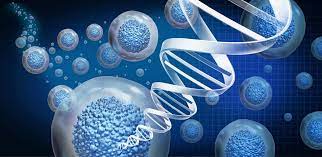Stem cell regeneration is a fascinating and revolutionary field in medical science that holds the promise of healing and rejuvenation. Stem cells, the body's raw materials, have the unique ability to develop into various cell types, making them a potent tool in regenerating damaged tissues and organs.
Types of Stem Cells
There are three primary types of stem cells: embryonic stem cells, adult stem cells, and induced pluripotent stem cells. Each type has distinct characteristics and potential applications in the field of regenerative medicine.
Mechanism of Stem Cell Regeneration
The process of stem cell regeneration involves intricate mechanisms such as differentiation and signaling pathways. Understanding how stem cells differentiate into specialized cells and communicate with surrounding tissues is crucial for harnessing their regenerative potential.
Applications in Medicine
Stem cell regeneration has transformative applications in medicine, ranging from treating degenerative diseases to facilitating tissue and organ transplantation. It has also found applications in cosmetic and reconstructive surgery, offering innovative solutions for various medical challenges.
Challenges and Controversies
Despite its immense potential, stem cell research faces challenges and controversies. Ethical concerns surrounding the use of embryonic stem cells, safety issues, and public perception are important factors that need to be addressed for responsible and effective implementation.
Recent Advancements in Stem Cell Research
Recent breakthroughs in stem cell research, including CRISPR technology for gene editing and 3D bioprinting for organ creation, showcase the dynamic nature of this field. Ongoing clinical trials further contribute to advancing our understanding of stem cell applications.
Future Prospects of Stem Cell Regeneration
The future of stem cell regeneration holds promises of personalized medicine, disease prevention, and an overall transformation in the healthcare industry. As research progresses, the potential impact on longevity and disease management becomes increasingly apparent.
Stem Cells in Regenerative Medicine
Regenerative medicine, leveraging the power of stem cells, has become a beacon of hope for patients with degenerative conditions. Examining real-world cases and success stories highlights the practical applications of stem cell therapy in various medical scenarios.
Ethical Considerations in Stem Cell Use
Balancing scientific progress with ethical considerations is imperative in the field of stem cell research. Global regulations, public awareness campaigns, and education initiatives play a crucial role in ensuring responsible and ethical use of stem cells.
Comparison with Traditional Treatment Methods
Comparing stem cell therapy with traditional treatment methods sheds light on its advantages and limitations. Integrating stem cell therapy with conventional medicine requires a comprehensive understanding of both approaches for optimal patient care.
The Role of Stem Cells in Anti-Aging
Stem cells play a pivotal role in anti-aging research, contributing to rejuvenation and tissue repair. Exploring the cosmetic applications of stem cells and their potential impact on longevity opens new avenues for research and development.
Stem Cell Banking
Preserving stem cells through banking offers a unique opportunity for future medical interventions. Examining the benefits, drawbacks, and accessibility of stem cell banking provides insights into its role in personalized medicine.
Prominent Figures in Stem Cell Research
Acknowledging the contributions of notable scientists and researchers in the field of stem cell research showcases the collaborative effort driving advancements. Nobel laureates and pioneers have played a crucial role in shaping the landscape of stem cell science.
Public Perception and Misconceptions
Addressing common myths and misconceptions about stem cells is vital for fostering public trust. Educating the public about the reality of stem cell research and dispelling misconceptions contribute to informed decision-making.
Conclusion
In conclusion, stem cell regeneration stands at the forefront of medical innovation, offering solutions to previously incurable conditions. As we navigate the complexities of ethical considerations and technological advancements, the ongoing commitment to responsible research and public education will shape the future of this groundbreaking field.
FAQs
- Are stem cells only used in treating serious medical conditions? Stem cells have diverse applications, ranging from treating severe diseases to cosmetic procedures and anti-aging research.
- What ethical guidelines govern stem cell research globally? Global regulations emphasize ethical considerations, ensuring responsible and transparent practices in stem cell research.
- What is the significance of differentiation in stem cell regeneration? Understanding the differentiation process is crucial, as it determines how stem cells develop into specialized cells, driving tissue regeneration.


No comments yet